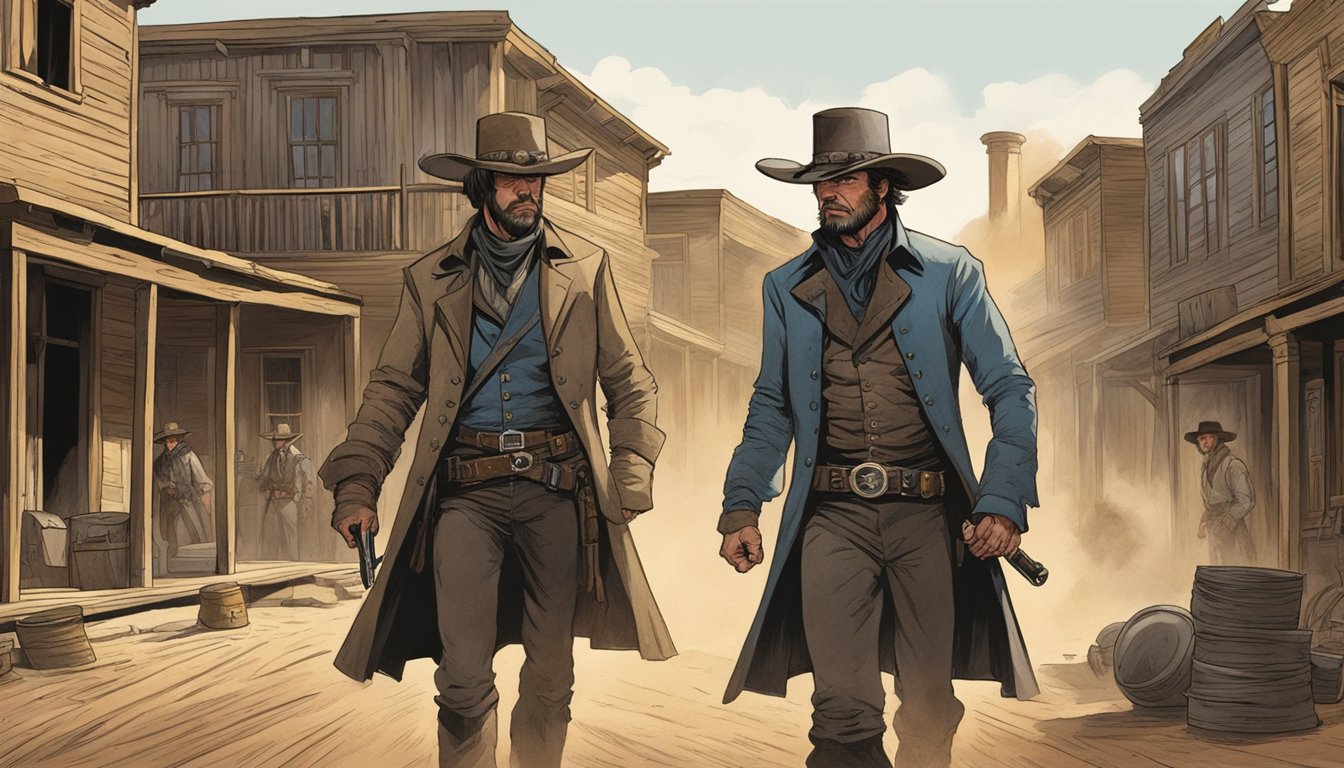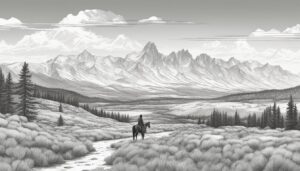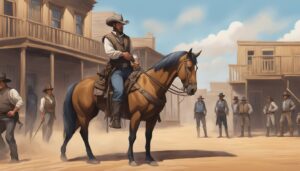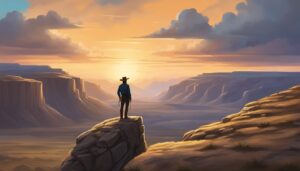Western heroes have captivated audiences for generations with their grit, determination, and unique moral codes. Two iconic figures stand out in this genre: John Dutton from the hit TV series Yellowstone and Jonah Hex from DC Comics. Both characters embody the rugged individualism and complex ethics associated with the American West.
John Dutton, portrayed by Kevin Costner, is the patriarch of the Dutton family and owner of the largest contiguous ranch in the United States. His character is deeply rooted in tradition, fiercely protective of his land, and willing to go to extreme lengths to preserve his family’s legacy. John Dutton’s impressive qualities lie in his strategic thinking, unwavering resolve, and ability to navigate the complex world of modern ranching and politics.
Jonah Hex, on the other hand, is a scarred bounty hunter with a troubled past and a personal code of honor. Created for DC Comics, Hex operates in the post-Civil War era, using his exceptional marksmanship and survival skills to protect the innocent and seek justice in a lawless frontier. His resilience in the face of adversity and his commitment to his own moral compass make him a compelling and enduring Western antihero.
Exploring the Western Genre
The Western genre has evolved from its traditional roots to embrace modern themes and settings. This evolution has given rise to neo-Westerns and incorporated historical influences that shape contemporary narratives.
Defining Neo-Western
Neo-Westerns blend classic Western elements with modern settings and themes. Shows like Yellowstone exemplify this subgenre, set in the present day but retaining core Western motifs. These productions explore conflicts over land, power, and identity in a contemporary context.
Neo-Westerns often feature complex characters who embody traditional archetypes while grappling with modern challenges. John Dutton in Yellowstone represents a modern-day rancher facing corporate interests and changing societal norms.
The aesthetic of neo-Westerns combines iconic Western imagery with modern technology and landscapes. This fusion creates a unique visual style that bridges past and present.
Influence of Historical Events
Historical events significantly shape Western narratives, both classic and neo. The expansion of the American frontier, conflicts with Native American tribes, and the Civil War provide rich source material for storytelling.
Series like 1883 and 1923 delve into specific historical periods, offering glimpses into the challenges faced by earlier generations. These prequels to Yellowstone explore themes of migration, settlement, and the birth of ranching empires.
Real-world issues such as land rights, resource conflicts, and cultural clashes continue to influence modern Westerns. These historical parallels add depth and relevance to contemporary stories, connecting past struggles with present-day dilemmas.
Key Creators and Influences

Taylor Sheridan and Kevin Costner have made significant contributions to “Yellowstone,” while Michelle Pfeiffer brought Jonah Hex’s wife to life. These creators and actors have shaped the characters and worlds of their respective Westerns.
Taylor Sheridan’s Vision
Taylor Sheridan, the creator of “Yellowstone,” has redefined the modern Western genre. His writing and directing style blend classic Western elements with contemporary themes. Sheridan’s approach focuses on complex characters and nuanced storytelling.
“Yellowstone” tackles issues like land rights, family loyalty, and political power struggles. Sheridan’s background as a Texas native informs his authentic portrayal of ranch life and Western culture.
His vision for John Dutton as a morally ambiguous protagonist has resonated with audiences. Sheridan’s storytelling emphasizes the gray areas of human nature, creating characters that defy simple categorization.
Cinematic Portrayals by Kevin Costner and Michelle Pfeiffer
Kevin Costner’s portrayal of John Dutton anchors “Yellowstone.” His performance brings depth and gravitas to the ranch patriarch. Costner’s extensive experience in Western films lends authenticity to his role.
The actor’s ability to convey both strength and vulnerability has made John Dutton a compelling character. Costner’s nuanced performance highlights Dutton’s internal struggles and complex motivations.
Michelle Pfeiffer portrayed Tallulah Black in the “Jonah Hex” film. Though her role was limited, Pfeiffer brought star power to the project. Her portrayal added depth to Hex’s backstory and personal relationships.
Both actors’ contributions have elevated their respective Western characters. Their performances have helped shape the cinematic landscape of modern Westerns.
Character Analysis: John Dutton

John Dutton stands as the central figure in Yellowstone, a complex character who embodies the struggles of maintaining tradition in a changing world. His multi-faceted personality drives the show’s narrative and conflicts.
Patriarch of the Dutton Family
John Dutton heads the Dutton family tree as the stern yet protective patriarch. He leads with an iron will, often making difficult decisions to ensure his family’s survival and legacy. His relationship with his children is complex, marked by both love and conflict. Beth, his daughter, receives his unwavering support despite her volatile nature. He maintains a strained bond with his son Jamie, while Kayce’s choices often clash with John’s vision for the ranch.
John’s leadership style stems from a deep-rooted sense of duty to preserve the Dutton name and way of life. This sometimes puts him at odds with family members who seek different paths.
Ranch Keeper and Protector
The Yellowstone Dutton Ranch is John’s primary focus and life’s work. He views the vast Montana property not just as land, but as a living legacy that must be protected at all costs. John employs both legal and questionable tactics to fend off threats to the ranch, including land developers, government agencies, and rival ranchers.
His dedication to the ranch often blurs ethical lines. John isn’t afraid to use violence or manipulation when he deems it necessary. This creates moral ambiguity around his character, as viewers grapple with whether to see him as a hero protecting his heritage or a villain willing to do anything to maintain control.
Political Ambitions and Governorship
John Dutton’s influence extends beyond his ranch into Montana’s political sphere. He leverages his connections and reputation to sway local politics in favor of ranching interests. His journey takes an unexpected turn when he runs for and wins the position of Governor of Montana.
As governor, John faces new challenges balancing his duty to the state with his personal interests. This role amplifies his political power but also puts him under increased scrutiny. John’s governorship becomes a tool to protect the ranching way of life on a larger scale, yet it also exposes him to new enemies and complications.
Character Analysis: Jonah Hex

Jonah Hex stands out as a complex antihero in Western comics. His scarred appearance and ruthless methods belie a strict moral code that drives his actions.
The Antihero’s Backstory
Jonah Woodson Hex was born in the mid-1800s. His abusive father sold him to Apache raiders, who raised him as one of their own. This upbringing shaped Hex’s survival skills and combat prowess.
After leaving the tribe, Hex fought for the Confederacy in the Civil War. Post-war, he became a bounty hunter, known for his deadly accuracy with firearms.
Hex’s most defining feature is the horrific scar on the right side of his face. This disfigurement resulted from a punishment by an Apache chief, marking Hex as an outcast.
Hex’s Morality and Ruthlessness
Jonah Hex operates by a personal code of honor. He protects the innocent and avenges wrongdoing, often taking on dangerous missions others won’t.
Hex’s methods are brutal and efficient. He shows no mercy to criminals and outlaws, dispatching them without hesitation.
Despite his rough exterior, Hex displays moments of compassion. He’s known to aid those in need, especially women and children.
Hex’s moral compass is unwavering. He refuses to compromise his principles, even when faced with lucrative offers that conflict with his ethics.
His ruthlessness is tempered by a strong sense of justice. Hex will pursue wrongdoers relentlessly, regardless of personal cost or danger.
Family Dynamics and Relationships

The Dutton family’s complex relationships form the core of Yellowstone’s narrative. Their interactions reveal deep-seated loyalties, fierce rivalries, and the struggle to balance personal desires with family obligations.
Dutton Family’s Internal Struggles
John Dutton leads the Dutton clan as the stoic patriarch, fiercely protecting his land and legacy. His children – Jamie, Beth, and Kayce – each grapple with their roles within the family and their individual aspirations.
Beth Dutton, known for her sharp wit and ruthless tactics, often clashes with her adoptive brother Jamie. Their turbulent relationship stems from a painful past incident and continues to shape family dynamics.
Kayce Dutton, torn between his loyalty to the ranch and his commitment to his wife Monica and son Tate, struggles to find his place. His efforts to balance these competing priorities create tension within the family unit.
Loyalty and Betrayal
Loyalty is a central theme in the Dutton family dynamic. John expects unwavering dedication from his children and ranch hands, particularly Rip Wheeler, who has become like a son to him.
Jamie Dutton’s actions often teeter on the edge of betrayal, as he navigates political ambitions and family obligations. His decisions frequently put him at odds with his father and siblings.
The show explores how loyalty can be both a strength and a weakness for the Duttons. Their fierce protectiveness of each other often leads to conflict with outsiders, while internal disagreements threaten to fracture their unity.
Family alliances shift as characters face moral dilemmas and conflicting interests. These changing dynamics keep viewers engaged and highlight the complex nature of familial relationships.
Themes of Power and Control

Power dynamics and the struggle for control are central to both John Dutton’s and Jonah Hex’s stories. These Western heroes face threats to their legacy and must leverage their influence to maintain dominance.
Duttons vs Land Developers
John Dutton’s primary conflict revolves around protecting the Yellowstone Ranch from land developers. He employs various tactics to thwart their advances, including political maneuvering and strategic alliances. Dutton’s unwavering dedication to preserving his family’s legacy drives his actions.
The ranch represents more than just land – it symbolizes the Dutton family’s power and influence in Montana. John’s children also play crucial roles in this struggle, each contributing their unique skills to defend their inheritance.
Land developers, on the other hand, seek to exploit the valuable resources of the Yellowstone Ranch. They represent the encroachment of modernization on traditional Western values.
Leverage and Manipulation
Both John Dutton and Jonah Hex are masters of leverage and manipulation in their respective worlds. Dutton uses his political connections and economic influence to outmaneuver his opponents. He’s not afraid to bend the rules or exploit others’ weaknesses to achieve his goals.
Jonah Hex, as a bounty hunter, relies on his cunning and reputation to gain the upper hand. His scarred appearance often serves as a psychological tool to intimidate adversaries.
These characters demonstrate that power in the West isn’t just about physical strength or gunfighting skills. It’s about understanding human nature and using that knowledge to control situations and people.
Their ability to manipulate circumstances often blurs the line between hero and antihero, adding complexity to their characters.
Conflict and Antagonists

John Dutton and Jonah Hex face formidable foes in their respective Western worlds. Their struggles against powerful adversaries and hostile environments shape their heroic journeys.
Rivalry and Resistance
John Dutton contends with numerous threats to his Yellowstone ranch. Land developers, native tribes, and rival ranchers all seek to claim pieces of his vast empire.
Governor Lynelle Perry emerges as a complex antagonist, using political power to challenge Dutton’s influence. Her actions often put her at odds with John’s interests.
Dutton’s infamous “train station” serves as a chilling reminder of how far he’ll go to eliminate threats. This remote dumping ground for bodies represents the darker side of his methods.
Jonah Hex battles a different breed of villain – outlaws, supernatural entities, and corrupt officials plague the post-Civil War landscape he inhabits.
Nature of Villainy in the West
The antagonists in Yellowstone reflect modern concerns: corporate greed, political corruption, and environmental exploitation. These villains operate through boardrooms and backroom deals.
John Dutton himself embodies moral ambiguity. His ruthless tactics in preserving his legacy blur the line between hero and antihero.
Jonah Hex’s enemies tend toward more traditional Western archetypes: gunslingers, bandits, and lawmen gone bad. His world also incorporates elements of the supernatural, pitting him against demonic forces and otherworldly threats.
Both heroes face villains that challenge not just their physical prowess, but their values and convictions.
Life on the Ranch

Ranch life in Yellowstone centers around the daily operations of the vast Dutton property. The characters face unique challenges while upholding traditional rodeo culture and relying on skilled ranch hands to keep things running smoothly.
Everyday Challenges and Rodeo Culture
Ranching demands constant vigilance. The Duttons contend with unpredictable weather, livestock health issues, and land disputes. Branding cattle and mending fences are routine tasks.
Rodeo culture thrives on the ranch. Characters like Jimmy Hurdstrom hone their skills in roping and bronc riding. These events showcase horsemanship and provide a sense of community.
Natural disasters pose significant threats. Wildfires and floods can devastate grazing lands and infrastructure, requiring swift action from the ranch crew.
Ranch Hands and Their Roles
Skilled workers are crucial to the ranch’s success. Teeter brings her no-nonsense attitude to cattle driving and general ranch work. Walker contributes his roping expertise and musical talents.
Lloyd Pierce serves as the seasoned foreman. His experience guides younger hands and helps maintain order. He often mediates disputes among the crew.
Ranch hands perform diverse tasks:
- Herding and branding cattle
- Maintaining fences and buildings
- Operating heavy machinery
- Training horses
Their roles extend beyond manual labor. Many become part of the Dutton family’s inner circle, loyal to the ranch’s interests in conflicts with outsiders.
Cultural Impact and Spinoffs

Yellowstone’s success has sparked a wave of spinoff series and redefined Western dramas for modern audiences. The show’s influence extends beyond television, shaping cultural trends and revitalizing interest in ranch life.
Yellowstone’s Influence on Television
Yellowstone has revitalized the Western genre for a new generation of viewers. The show’s popularity on Paramount Network has led to increased demand for similar productions. Its success has influenced fashion trends, boosted tourism to filming locations, and sparked renewed interest in ranch life and Western aesthetics.
The series has become a cultural touchstone, generating discussions about land ownership, family legacy, and the changing American West. Its impact is evident in the surge of Western-themed content across various media platforms.
Expansion of the Dutton Universe
Paramount+ has capitalized on Yellowstone’s popularity by expanding the Dutton family saga through multiple spinoff series. “1883” explores the family’s 19th-century origins, while “1923” focuses on an earlier generation of Duttons.
Future spinoffs include “6666,” set on the Four Sixes Ranch in Texas, and “1944,” which will likely explore the Dutton family during World War II. “The Madison” is another planned series, though details remain scarce.
These spinoffs serve to deepen the Yellowstone universe, providing context and depth to the Dutton family history. They offer viewers a chance to explore different eras and aspects of Western life, further cementing Yellowstone’s place in television history.



